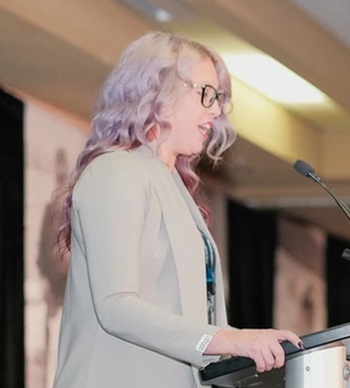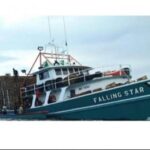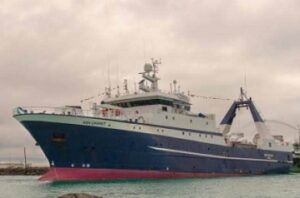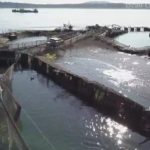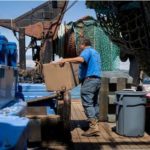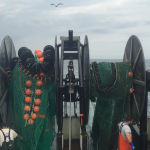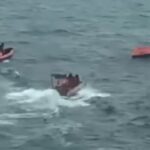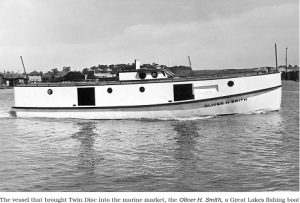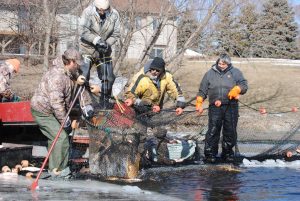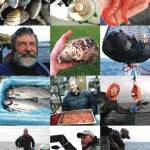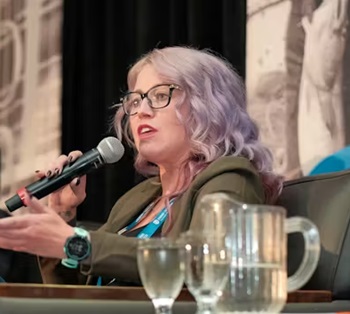 After two seasons of navigating turbulent waters, there is a sense of hope that the Newfoundland and Labrador fishery can finally sail into calmer conditions in April 2024. There was certainly no shortage of conflict on many fronts in 2024, despite efforts to get past some of the tensions that plagued the 2023 season. The provincial government had to step in and help resolve a tie-up by snow crab harvesters in the spring of 2023 that led to a six-week delay to the traditional start of the fishing season. The government formed a committee tasked with finding a better way to settle snow crab pricing, but even its recommendations failed to prevent another disagreement that led to another delayed start in April 2024. more, >>CLICK TO READ<< 09:01
After two seasons of navigating turbulent waters, there is a sense of hope that the Newfoundland and Labrador fishery can finally sail into calmer conditions in April 2024. There was certainly no shortage of conflict on many fronts in 2024, despite efforts to get past some of the tensions that plagued the 2023 season. The provincial government had to step in and help resolve a tie-up by snow crab harvesters in the spring of 2023 that led to a six-week delay to the traditional start of the fishing season. The government formed a committee tasked with finding a better way to settle snow crab pricing, but even its recommendations failed to prevent another disagreement that led to another delayed start in April 2024. more, >>CLICK TO READ<< 09:01
Category Archives: Canada
2017–2025 North Atlantic Right Whale Unusual Mortality Event
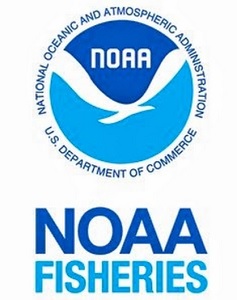 Beginning in 2017, elevated mortalities in North Atlantic right whales (Eubalaena glacialis) were documented in Canada and the United States and necessitated an Unusual Mortality Event (UME) be declared. The whales impacted by the UME include dead, injured, and sick individuals, who represent more than 20 percent of the population, which is a significant impact on an endangered species where deaths are outpacing births. Additionally, research demonstrates that only about 1/3 of right whale deaths are documented. The preliminary cause of mortality, serious injury, and morbidity (sublethal injury and illness) in most of these whales is from entanglements or vessel strikes. Endangered North Atlantic right whales are approaching extinction. There are approximately 370 individuals remaining, including about 70 reproductively active females. Human impacts continue to threaten the survival of this species. The many individual whales involved in the UME are a significant setback to the recovery of this endangered species. Links, graphics, more, >>CLICK TO READ<< 10:29
Beginning in 2017, elevated mortalities in North Atlantic right whales (Eubalaena glacialis) were documented in Canada and the United States and necessitated an Unusual Mortality Event (UME) be declared. The whales impacted by the UME include dead, injured, and sick individuals, who represent more than 20 percent of the population, which is a significant impact on an endangered species where deaths are outpacing births. Additionally, research demonstrates that only about 1/3 of right whale deaths are documented. The preliminary cause of mortality, serious injury, and morbidity (sublethal injury and illness) in most of these whales is from entanglements or vessel strikes. Endangered North Atlantic right whales are approaching extinction. There are approximately 370 individuals remaining, including about 70 reproductively active females. Human impacts continue to threaten the survival of this species. The many individual whales involved in the UME are a significant setback to the recovery of this endangered species. Links, graphics, more, >>CLICK TO READ<< 10:29
Furey Reflects on Changes in Fishery Following Protests, Negotiations
 The Premier believes that more changes were made to the fishery in 2024 than under any other administration in the history of the province. Last spring was a tumultuous time in the fishery. Frustrated harvesters began showing up at the House of Assembly every day during the fall sitting, demanding some systemic changes to the way the fishery operates, which ultimately culminated in days of protests that effectively shut down Confederation Building – including on budget day. Andrew Furey says government is essentially a facilitator between the two parties -meaning the FFAW and ASP- and ultimately got “caught in the crossfire.” more, >>CLICK TO READ<< 15:23
The Premier believes that more changes were made to the fishery in 2024 than under any other administration in the history of the province. Last spring was a tumultuous time in the fishery. Frustrated harvesters began showing up at the House of Assembly every day during the fall sitting, demanding some systemic changes to the way the fishery operates, which ultimately culminated in days of protests that effectively shut down Confederation Building – including on budget day. Andrew Furey says government is essentially a facilitator between the two parties -meaning the FFAW and ASP- and ultimately got “caught in the crossfire.” more, >>CLICK TO READ<< 15:23
Athearn Marine Agency Boat of the Week: 68′ Raised Wheelhouse Longliner, Cummins KT1150, Tripack permit available
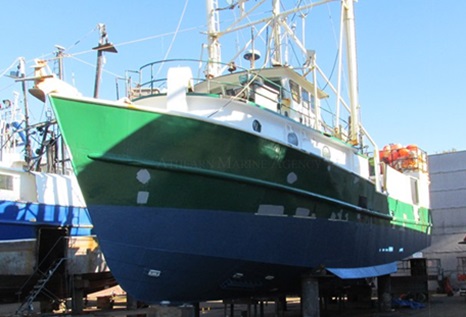 To review specifications, information, and 50 photos’, >click here<. To see all the boats in this series >click here< 07:03
To review specifications, information, and 50 photos’, >click here<. To see all the boats in this series >click here< 07:03
d’Entremont talks fishery mismanagement, violence in Clare
The MP for West Nova says fishery disputes were top of mind in 2024. Conservative Chris d’Entremont says the federal government has mismanaged the herring and elver fishery and have not been properly enforcing illegal lobster fishing in Clare. He says Minister Diane Lebouthillier is too worried about her own riding in Quebec. “Fishery-wise, 2024 wasn’t the year we wanted. I was hoping we’d have some ears that would listen to us. We continue to get pushed aside for political reasons,” said d’Entremont. d’Entremont says southwest Nova didn’t get a cent out of Small Craft Harbour funding, with 60-70 percent of it going to the minister’s riding. more, >>CLICK TO READ<< 12:50
federal government has mismanaged the herring and elver fishery and have not been properly enforcing illegal lobster fishing in Clare. He says Minister Diane Lebouthillier is too worried about her own riding in Quebec. “Fishery-wise, 2024 wasn’t the year we wanted. I was hoping we’d have some ears that would listen to us. We continue to get pushed aside for political reasons,” said d’Entremont. d’Entremont says southwest Nova didn’t get a cent out of Small Craft Harbour funding, with 60-70 percent of it going to the minister’s riding. more, >>CLICK TO READ<< 12:50
New memorial in southeastern P.E.I. community honours fishers who were taken by the sea
 Residents of Murray Harbour say a new monument will serve as a tribute to people from the community who lost their lives at sea, and an important reminder of the dangers for those who continue to take the risk of going out on the water. The southeastern P.E.I. community recently took possession of the 1,200-pound memorial that now sits at the harbour, overlooking the boats that will come and go during the busy fishing seasons. “There’s been a lot of people over the years, unfortunately, [who] never came home from the sea. It was time that we made a memorial, something to remember those people by,” said Gary MacKay, Murray Harbour’s deputy mayor. Photos, video, more, >>CLICK TO READ<< 07:50
Residents of Murray Harbour say a new monument will serve as a tribute to people from the community who lost their lives at sea, and an important reminder of the dangers for those who continue to take the risk of going out on the water. The southeastern P.E.I. community recently took possession of the 1,200-pound memorial that now sits at the harbour, overlooking the boats that will come and go during the busy fishing seasons. “There’s been a lot of people over the years, unfortunately, [who] never came home from the sea. It was time that we made a memorial, something to remember those people by,” said Gary MacKay, Murray Harbour’s deputy mayor. Photos, video, more, >>CLICK TO READ<< 07:50
Crab pot retrieval concept crashes
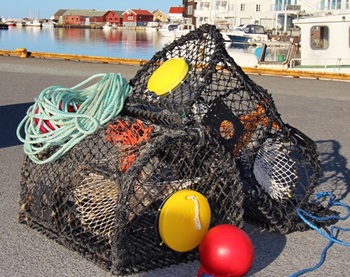 Norwegian company Resqunit, with Deadliest Catch star Sig Hansen as global brand ambassador for its ingenious trap retrieval concept, has crashed into bankruptcy with debts of NoK13.5 million – equivalent to over a million euros. The bankruptcy was announced in August, in contrast to the initial fanfare of publicity and optimism as the company’s owners expected the world to embrace its product. A holding company was registered in Sweden in 2021. Soon afterwards the holding company was listed on the US Nasdaq First North Growth Market. Things happened fast for Resqunit and the next step was company was set up in Canada as the concept seemed to be something that couldn’t go wrong as governments, researchers and environmental organisations had ghost fishing high up on the agenda. Photos, more, >>CLICK TO READ<< 12:15
Norwegian company Resqunit, with Deadliest Catch star Sig Hansen as global brand ambassador for its ingenious trap retrieval concept, has crashed into bankruptcy with debts of NoK13.5 million – equivalent to over a million euros. The bankruptcy was announced in August, in contrast to the initial fanfare of publicity and optimism as the company’s owners expected the world to embrace its product. A holding company was registered in Sweden in 2021. Soon afterwards the holding company was listed on the US Nasdaq First North Growth Market. Things happened fast for Resqunit and the next step was company was set up in Canada as the concept seemed to be something that couldn’t go wrong as governments, researchers and environmental organisations had ghost fishing high up on the agenda. Photos, more, >>CLICK TO READ<< 12:15
Industry withholding data on one of Canada’s largest fisheries, advocates say
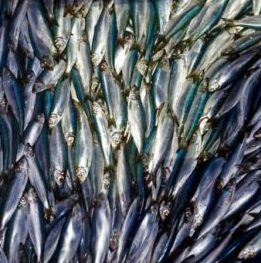 Advocates and scientists are raising concerns with the availability of data on one of Canada’s largest fisheries, as the Department of Fisheries and Oceans DFO is waiting on industry to provide data on the herring fishery in southwest Nova Scotia and the Bay of Fundy. For decades, herring stock has been declining and has been in the critical zone since 2018. In July, DFO reduced the total allowable catch to 16,000 tonnes per season, from 21,000, fixing the quota at the reduced level until 2027. Since then, advocates say the Herring Science Council — an industry body that, through an agreement with DFO, gathers the data that’s the only source of scientific information on the fishery — has not provided to the department the information it has collected. more, >>CLICK TO READ<< 08:12
Advocates and scientists are raising concerns with the availability of data on one of Canada’s largest fisheries, as the Department of Fisheries and Oceans DFO is waiting on industry to provide data on the herring fishery in southwest Nova Scotia and the Bay of Fundy. For decades, herring stock has been declining and has been in the critical zone since 2018. In July, DFO reduced the total allowable catch to 16,000 tonnes per season, from 21,000, fixing the quota at the reduced level until 2027. Since then, advocates say the Herring Science Council — an industry body that, through an agreement with DFO, gathers the data that’s the only source of scientific information on the fishery — has not provided to the department the information it has collected. more, >>CLICK TO READ<< 08:12
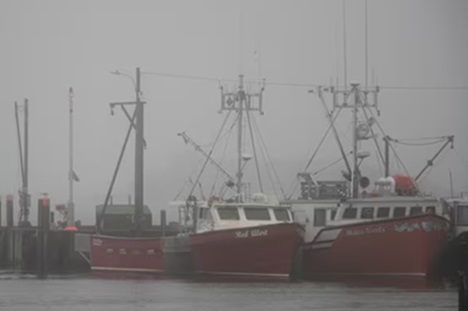
Disabled lobster licence holder wins again against DFO in court
The Federal Court has once again faulted the Department of Fisheries and Oceans for how it has handled the cases of disabled lobster licence holders who sought lengthy exemptions from federal rules that require them to be on board the boat when it is fishing. In a pair of decisions this week, Justice Richard Southcott ruled the deputy minister didn’t properly take into account whether two Nova Scotia fishermen would be discriminated against when the department indicated it would stop allowing substitutes to fill in for them. Federal provisions allow a licence holder with a medical condition to be replaced by a substitute on board, but only for five years. Once that time was up, Robinson was told he could no longer use a stand-in. more, >>CLICK TO READ<< 16:38
John DeMont: The magic of Christmas is the people who make it happen
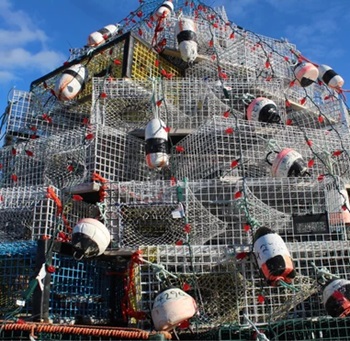 I agree wholeheartedly with the notion that there is something magical about Christmas. The magic, in part, is that it somehow happens every year in our house with no discernible help from me. I say this with shame, not pride. Yet, in some ways, it is for the best. The gift giving — which requires a razor’s edge balance of taste, pragmatism and good will — falls, for good reason, as lightly as a snowflake upon my shoulders. At this point, a thought often occurs to me similar to the one passing through my mind when I head downstairs on Christmas morning: that for this magic to occur, extraordinary people must do remarkable things. In the case of the fisher folk, they must rise in the dark and don layers of clothes. They must drive to a wharf, then they must steam kilometres out on the wild Atlantic Ocean, where they then will hoist up traps from the depths. more, >>CLICK TO READ<< 08:22
I agree wholeheartedly with the notion that there is something magical about Christmas. The magic, in part, is that it somehow happens every year in our house with no discernible help from me. I say this with shame, not pride. Yet, in some ways, it is for the best. The gift giving — which requires a razor’s edge balance of taste, pragmatism and good will — falls, for good reason, as lightly as a snowflake upon my shoulders. At this point, a thought often occurs to me similar to the one passing through my mind when I head downstairs on Christmas morning: that for this magic to occur, extraordinary people must do remarkable things. In the case of the fisher folk, they must rise in the dark and don layers of clothes. They must drive to a wharf, then they must steam kilometres out on the wild Atlantic Ocean, where they then will hoist up traps from the depths. more, >>CLICK TO READ<< 08:22
Elver prosecutions trickle into court after ‘hell’ year on N.S. and N.B. rivers
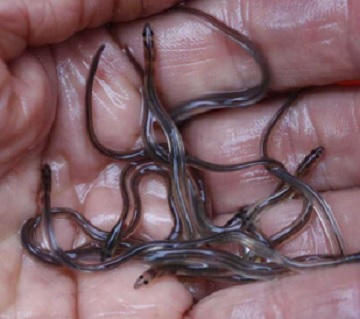 About three dozen people have been charged with offences related to this year’s chaotic illegal fishery for juvenile eels in the Maritimes, a number that falls well short of the overall tally of arrests this spring but which the federal Department of Fisheries and Oceans says could grow. The enforcement of the lucrative fishery for the tiny eels, also known as elvers, has been heavily scrutinized in recent years, with many in the industry outspoken about what they view as a failure to crack down on rampant poaching. The department said Friday that 37 people have been charged with elver-related fisheries offences committed in 2024, providing for the first time a concrete number of prosecutions that have emerged from a year when fisheries officers struggled badly to keep pace. more. >>CLICK TO READ<< 19: 03
About three dozen people have been charged with offences related to this year’s chaotic illegal fishery for juvenile eels in the Maritimes, a number that falls well short of the overall tally of arrests this spring but which the federal Department of Fisheries and Oceans says could grow. The enforcement of the lucrative fishery for the tiny eels, also known as elvers, has been heavily scrutinized in recent years, with many in the industry outspoken about what they view as a failure to crack down on rampant poaching. The department said Friday that 37 people have been charged with elver-related fisheries offences committed in 2024, providing for the first time a concrete number of prosecutions that have emerged from a year when fisheries officers struggled badly to keep pace. more. >>CLICK TO READ<< 19: 03
Ottawa has ‘carefully calculated plan’ to wreck eel business: lawsuit
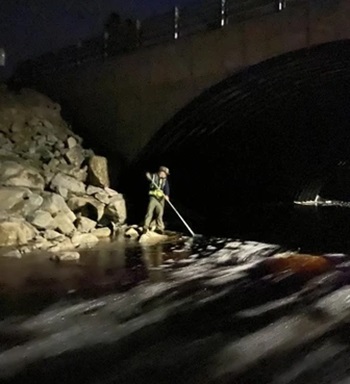 A New Brunswick entrepreneur whose family pioneered the baby eel industry in Canada is suing Ottawa again after it told her she would likely lose nearly 90 per cent of her business to First Nations and other people who want to get in on the lucrative fishery. In a filing in the Court of King’s Bench in Fredericton on Dec. 9, Mary Ann Holland accuses the defendants, who include three successive federal fisheries ministers and eight high-ranking officials in the Department of Fisheries and Oceans, or DFO, of having “engaged in a carefully calculated plan” over the years to drive her “out of business,” and give it away to First Nations and other fishers. “Such a plan represents patent gross abuse,” that they know will cause her companies, Brunswick Aquaculture and Alder Seafood, great damage, the lawsuit states. more, >>CLICK TO READ<< 14:56
A New Brunswick entrepreneur whose family pioneered the baby eel industry in Canada is suing Ottawa again after it told her she would likely lose nearly 90 per cent of her business to First Nations and other people who want to get in on the lucrative fishery. In a filing in the Court of King’s Bench in Fredericton on Dec. 9, Mary Ann Holland accuses the defendants, who include three successive federal fisheries ministers and eight high-ranking officials in the Department of Fisheries and Oceans, or DFO, of having “engaged in a carefully calculated plan” over the years to drive her “out of business,” and give it away to First Nations and other fishers. “Such a plan represents patent gross abuse,” that they know will cause her companies, Brunswick Aquaculture and Alder Seafood, great damage, the lawsuit states. more, >>CLICK TO READ<< 14:56
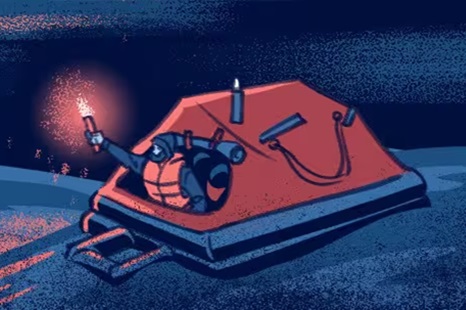
Lost at Sea
When a group of seven fishermen went missing off the northeast coast of Newfoundland in July, the small community of New-Wes-Valley was gripped with dread. Coast Guard captain Colin Roul describes the waters around Newfoundland and Labrador as dangerous and unforgiving. “Usually, when you hear distress situations like this, where no sign or sound was heard from these guys, yeah, the outcome is bleak,” he said. As 24 hours turned to 36, then 48, not much hope remained. “We knew this was going to be a regional funeral,” said Michael Tiller, mayor of New-Wes-Valley, where five of the seven men were from. “The food was ready. The place was booked. We were ready to help this town go through one of the worst disasters that it could ever go through. “But then, news of the nearly impossible — the men were found in a raft about 270 kilometres from shore. Photos, more, >>CLICK TO READ<< 07:43
F/V Elite Navigator, 10 posts, >>CLICK TO READ<<
Nova Scotia against proposal to reallocate commercial elver quota
 “We just don’t agree,” Houston said about Ottawa’s proposal, which he called a shining example of the government’s “inability to properly understand and manage the fishery. It’s been communicated to them that we are not a fan of what they are trying to do there.” The elver fishery in the Maritimes has been tainted in recent years by drama and violence because of how profitable it is — the baby eels had reached market values as high as about $5,000 per kilogram in recent years. Under the proposed pilot allocation, the federal Fisheries Department is offering licences to 120 fishers currently employed by commercial licence holders, granting them 27 per cent of the overall quota. A further 1.5 per cent would be allocated to licences offered to 30 fishers who currently catch adult eels. more, >>CLICK TO READ<< 10:49
“We just don’t agree,” Houston said about Ottawa’s proposal, which he called a shining example of the government’s “inability to properly understand and manage the fishery. It’s been communicated to them that we are not a fan of what they are trying to do there.” The elver fishery in the Maritimes has been tainted in recent years by drama and violence because of how profitable it is — the baby eels had reached market values as high as about $5,000 per kilogram in recent years. Under the proposed pilot allocation, the federal Fisheries Department is offering licences to 120 fishers currently employed by commercial licence holders, granting them 27 per cent of the overall quota. A further 1.5 per cent would be allocated to licences offered to 30 fishers who currently catch adult eels. more, >>CLICK TO READ<< 10:49
Mik’maq elver fishers hope quotas create safety on N.S. rivers, but critics doubtful
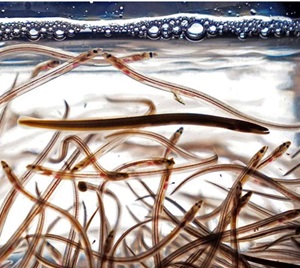 Indigenous elver fishers who once were at odds with federal fisheries officers say they’re hopeful that a new plan to provide them quotas this season will create more peace on the water. Earlier this month, a letter released by the federal Fisheries Department proposed a new quota system for the lucrative baby eel fishery that shifts 50 per cent of the total allowable catch of about 9,960 kilograms to First Nations fishers from commercial licence holders. Commercial elver fishers in the Maritimes have condemned the new system, saying it slashes their quotas without compensation, leaving little motivation for non-Indigenous companies to share their methods and facilities with the Indigenous entrants. more, >>CLICK TO READ<< 09:02
Indigenous elver fishers who once were at odds with federal fisheries officers say they’re hopeful that a new plan to provide them quotas this season will create more peace on the water. Earlier this month, a letter released by the federal Fisheries Department proposed a new quota system for the lucrative baby eel fishery that shifts 50 per cent of the total allowable catch of about 9,960 kilograms to First Nations fishers from commercial licence holders. Commercial elver fishers in the Maritimes have condemned the new system, saying it slashes their quotas without compensation, leaving little motivation for non-Indigenous companies to share their methods and facilities with the Indigenous entrants. more, >>CLICK TO READ<< 09:02
Gear tampering becoming more frequent in Gulf region, says DFO — and that means more ghost gear
 Gear tampering in the Gulf of St. Lawrence region off P.E.I. is more common than it used to be, according to the Department of Fisheries and Oceans, and the environmental cost can be high. “Gear tampering is any action that interferes or disrupts a legal fishery,” said Matthew MacEwen, the detachment supervisor in Charlottetown for Conservation Protection with Fisheries and Oceans Canada. “Examples of this could be tampering with traps, nets or lines… causing damage to that fishing gear that renders them incapable of doing their job fishing.” MacEwen said it could include cutting the ropes off traps, making them unretrievable, or bringing traps up from the waters and destroying the webbing and mesh that keep lobsters inside once they enter the traps. Video, photos, more, >>CLICK TO READ<< 06:26
Gear tampering in the Gulf of St. Lawrence region off P.E.I. is more common than it used to be, according to the Department of Fisheries and Oceans, and the environmental cost can be high. “Gear tampering is any action that interferes or disrupts a legal fishery,” said Matthew MacEwen, the detachment supervisor in Charlottetown for Conservation Protection with Fisheries and Oceans Canada. “Examples of this could be tampering with traps, nets or lines… causing damage to that fishing gear that renders them incapable of doing their job fishing.” MacEwen said it could include cutting the ropes off traps, making them unretrievable, or bringing traps up from the waters and destroying the webbing and mesh that keep lobsters inside once they enter the traps. Video, photos, more, >>CLICK TO READ<< 06:26
From fisherman to mayor, and 20 Questions
 This year, Mayor Tony Ryan of Port Saunders is celebrating 35 years in the big chair of the Northern Peninsula town. As a fisherman by trade, Ryan had never anticipated that he would have ended up running in a mayoral election. “I’ve been (a fisherman) all of my life,” he said. “I’ve been at fishing for 50 years, in the mobile sector, the shrimp fleet. “We had our own boat, and we fished a lot of shrimp. I’m still at it.” It wasn’t until the previous mayor came to Ryan and encouraged him, that he decided to run. He added that being the chair of the fishermen’s committee prior to becoming mayor helped him to enter the position with a decent understanding of how an organization is run. However, there was still a learning curve. “You have to learn as you go,” he said. Becoming mayor is one thing, staying in the position for 35 years is another. more, >>CLICK TO READ<< 15:59
This year, Mayor Tony Ryan of Port Saunders is celebrating 35 years in the big chair of the Northern Peninsula town. As a fisherman by trade, Ryan had never anticipated that he would have ended up running in a mayoral election. “I’ve been (a fisherman) all of my life,” he said. “I’ve been at fishing for 50 years, in the mobile sector, the shrimp fleet. “We had our own boat, and we fished a lot of shrimp. I’m still at it.” It wasn’t until the previous mayor came to Ryan and encouraged him, that he decided to run. He added that being the chair of the fishermen’s committee prior to becoming mayor helped him to enter the position with a decent understanding of how an organization is run. However, there was still a learning curve. “You have to learn as you go,” he said. Becoming mayor is one thing, staying in the position for 35 years is another. more, >>CLICK TO READ<< 15:59
Some in seafood industry see Trump as fishermen’s friend, but tariffs could make for pricier fish
 The incoming administration of President-elect Donald Trump is likely to bring big changes for one of the oldest sectors of the U.S. economy, seafood, and some in the industry believe the returning president will be more responsive to its needs. Economic analysts paint a more complicated picture, as they fear Trump’s pending trade hostilities with major trading partners Canada and China could make an already pricy kind of protein more expensive to consumers. Conservationists also fear Trump’s emphasis on government deregulation could jeopardize fish stocks that are already in peril. But many in the commercial fishing and seafood processing industries said they are excited for Trump’s second presidency. They said they expect he’ll allow fishing in protected areas as he did in his first presidency, crack down on offshore wind expansion and cut back regulations they describe as burdensome. And they expect a marked shift from the administration of President Joe Biden, who prioritized ocean conservation and championed wind power from the start. Video, more, >>CLICK TO READ<< 10:26
The incoming administration of President-elect Donald Trump is likely to bring big changes for one of the oldest sectors of the U.S. economy, seafood, and some in the industry believe the returning president will be more responsive to its needs. Economic analysts paint a more complicated picture, as they fear Trump’s pending trade hostilities with major trading partners Canada and China could make an already pricy kind of protein more expensive to consumers. Conservationists also fear Trump’s emphasis on government deregulation could jeopardize fish stocks that are already in peril. But many in the commercial fishing and seafood processing industries said they are excited for Trump’s second presidency. They said they expect he’ll allow fishing in protected areas as he did in his first presidency, crack down on offshore wind expansion and cut back regulations they describe as burdensome. And they expect a marked shift from the administration of President Joe Biden, who prioritized ocean conservation and championed wind power from the start. Video, more, >>CLICK TO READ<< 10:26
Fire destroys lobster boat in Canada Creek, N.S.
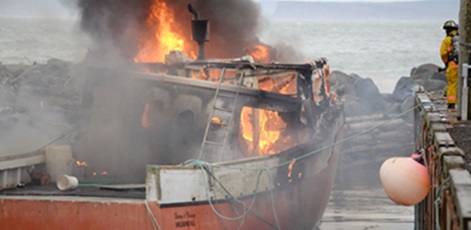 A fire on a lobster fishing boat in Canada Creek, N.S., took several hours to get under control, according to the local fire department. Kevin Ernest, spokesperson for the Waterville and District Fire Department, says emergency services were called to the wharf around 9:30 a.m. Thursday. By the time the fire department arrived, the boat was fully engulfed in flames. Ernest says it was a “stubborn fire” that was difficult to get out due to the amount of fuel on board. more, >>CLICK TO READ<< 15:56
A fire on a lobster fishing boat in Canada Creek, N.S., took several hours to get under control, according to the local fire department. Kevin Ernest, spokesperson for the Waterville and District Fire Department, says emergency services were called to the wharf around 9:30 a.m. Thursday. By the time the fire department arrived, the boat was fully engulfed in flames. Ernest says it was a “stubborn fire” that was difficult to get out due to the amount of fuel on board. more, >>CLICK TO READ<< 15:56
Sipekne’katik claims ‘significant progress’ in talks with Ottawa over controversial N.S. lobster fishery
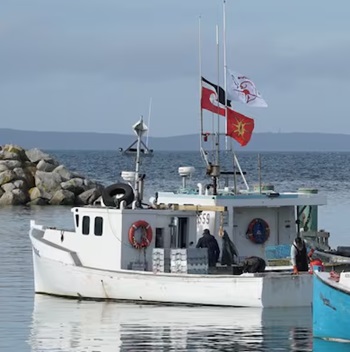 The First Nation at the centre of a highly contentious out-of-season lobster fishery in southwest Nova Scotia says mediation with the federal government is bearing fruit, with lengthy meetings between both sides leading to the first “meaningful dialogue” in 25 years. The comments from the lawyer for Sipekne’katik First Nation come in a letter to a Nova Scotia Supreme Court judge that asks that litigation launched by the band against the federal government in 2021 be paused for another six months to allow negotiations to continue. The two sides, along with intervenor Unified Fisheries Conservation Alliance, which represents commercial fishing interests, are expected to discuss the time extension in court this morning. more, >>CLICK TO READ<< 08:02
The First Nation at the centre of a highly contentious out-of-season lobster fishery in southwest Nova Scotia says mediation with the federal government is bearing fruit, with lengthy meetings between both sides leading to the first “meaningful dialogue” in 25 years. The comments from the lawyer for Sipekne’katik First Nation come in a letter to a Nova Scotia Supreme Court judge that asks that litigation launched by the band against the federal government in 2021 be paused for another six months to allow negotiations to continue. The two sides, along with intervenor Unified Fisheries Conservation Alliance, which represents commercial fishing interests, are expected to discuss the time extension in court this morning. more, >>CLICK TO READ<< 08:02
Newfoundland towns light up harbours to honour fishers and pray for their safety
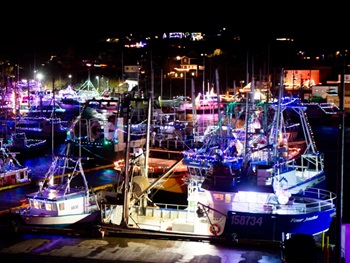 On a twinkling wharf in a small Newfoundland town, a crowd of about 100 people stopped singing and chatting on Friday night to bow their heads in a moment of silence for local fish harvesters. Now in its 26th year, the boat lighting in Port de Grave, N.L., draws visitors from all over the province, but organizers have kept the town’s fishers at the heart of the ceremony. Port de Grave’s event began with a single fisherman, Eric Lear, deciding to light up his boat on Christmas. It has since grown and now requires volunteers to direct cars from out of town into designated parking areas. more, >>CLICK TO READ<< 09:10
On a twinkling wharf in a small Newfoundland town, a crowd of about 100 people stopped singing and chatting on Friday night to bow their heads in a moment of silence for local fish harvesters. Now in its 26th year, the boat lighting in Port de Grave, N.L., draws visitors from all over the province, but organizers have kept the town’s fishers at the heart of the ceremony. Port de Grave’s event began with a single fisherman, Eric Lear, deciding to light up his boat on Christmas. It has since grown and now requires volunteers to direct cars from out of town into designated parking areas. more, >>CLICK TO READ<< 09:10
Athearn Marine Agency Boat of the Week: 44’11” Provincial Longliner Rod & Reel
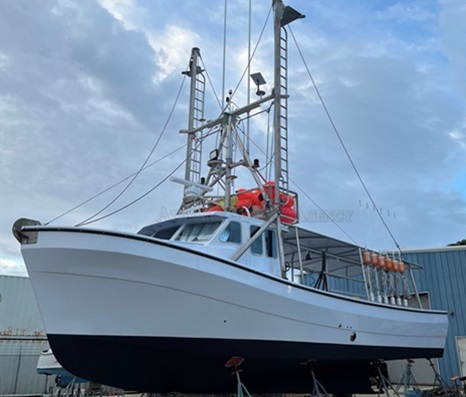 To review specifications, information, and 37 photos’, >click here<. To see all the boats in this series >click here< 06:21
To review specifications, information, and 37 photos’, >click here<. To see all the boats in this series >click here< 06:21
Portugal: Cod fishing near Canada reopens after 32 years
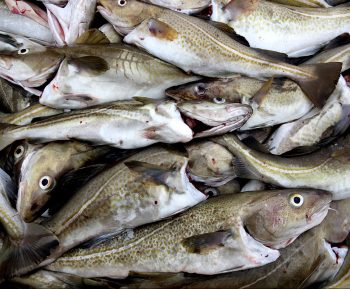 Portugal’s minister of agriculture and fisheries, José Manuel Fernandes, announced on Sunday the reopening of a cod fishing area near Canada after 32 years and said that current scientific data contradicted the proposed cut in red seabream. Speaking to Lusa, José Manuel Fernandes said that the 35% cut, to 399 tonnes, in catches of red seabream in Azorean waters, proposed on 31 October by the EU government, is based on scientific data from 2021. ‘This cut is based on scientific data from 2021 and does not reflect the recovery’ of red seabream that has been observed in the meantime, the minister emphasised, speaking to Lusa in Brussels. more, >>CLICK TO READ<< 12:11
Portugal’s minister of agriculture and fisheries, José Manuel Fernandes, announced on Sunday the reopening of a cod fishing area near Canada after 32 years and said that current scientific data contradicted the proposed cut in red seabream. Speaking to Lusa, José Manuel Fernandes said that the 35% cut, to 399 tonnes, in catches of red seabream in Azorean waters, proposed on 31 October by the EU government, is based on scientific data from 2021. ‘This cut is based on scientific data from 2021 and does not reflect the recovery’ of red seabream that has been observed in the meantime, the minister emphasised, speaking to Lusa in Brussels. more, >>CLICK TO READ<< 12:11
DFO to increase year-round lobster gear monitoring in Bay of Fundy
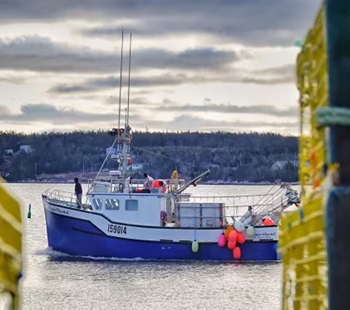 Enforcement officers with the federal Department of Fisheries and Oceans will soon have a new tool to lift, check and seize illegal lobster fishing gear from the waters between Nova Scotia and New Brunswick. The department is seeking a crew and vessel that would be contracted to take DFO officers on patrols to inspect fishing equipment. The patrol work isn’t new, but this contract represents an increase in surveillance and enforcement in an area where the fishing industry has called on officers to do more to deter illegal fishing operations. The contracted vessel would be responsible for patrolling throughout the Bay of Fundy and “be able to berth at various ports in New Brunswick and Nova Scotia,” according to the documents published online. more, >>CLICK TO READ<< 07:33
Enforcement officers with the federal Department of Fisheries and Oceans will soon have a new tool to lift, check and seize illegal lobster fishing gear from the waters between Nova Scotia and New Brunswick. The department is seeking a crew and vessel that would be contracted to take DFO officers on patrols to inspect fishing equipment. The patrol work isn’t new, but this contract represents an increase in surveillance and enforcement in an area where the fishing industry has called on officers to do more to deter illegal fishing operations. The contracted vessel would be responsible for patrolling throughout the Bay of Fundy and “be able to berth at various ports in New Brunswick and Nova Scotia,” according to the documents published online. more, >>CLICK TO READ<< 07:33
People who fish off P.E.I. have mixed reaction to new parental leave benefits
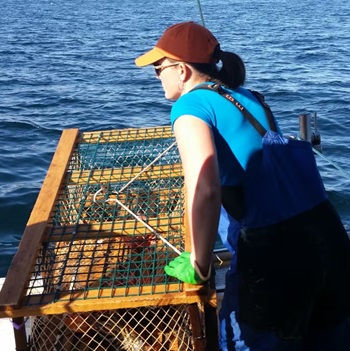 Some lobster fishing captains on Prince Edward Island say they think there will be little interest in new parental leave benefits just announced by the federal government. On Thursday, Ottawa announced maternity and parental benefits for people licensed to fish in Atlantic Canada, saying that could encourage the next generation of harvesters to join the fishing industry and provide more flexibility to those with new families. “I don’t think there’ll be a lot of uptake on it,” said lobster captain Charlie McGeoghegan, who fishes out of Pinette on P.E.I.’s south shore. “I haven’t heard anybody even ask for it, so I’m not sure where this came from.” Video, more, >>CLICK TO READ<< 07:26
Some lobster fishing captains on Prince Edward Island say they think there will be little interest in new parental leave benefits just announced by the federal government. On Thursday, Ottawa announced maternity and parental benefits for people licensed to fish in Atlantic Canada, saying that could encourage the next generation of harvesters to join the fishing industry and provide more flexibility to those with new families. “I don’t think there’ll be a lot of uptake on it,” said lobster captain Charlie McGeoghegan, who fishes out of Pinette on P.E.I.’s south shore. “I haven’t heard anybody even ask for it, so I’m not sure where this came from.” Video, more, >>CLICK TO READ<< 07:26
In once tranquil N.S. town, intimidation in the lobster industry now all too common
 Standing by a bullet hole in his dining room wall, lobster buyer Geoffrey Jobert says such attacks have become an all-too-familiar reality in Nova Scotia’s largest fishery. The 30-year-old and his younger brother came to the area from Halifax to take over his father’s processing plant five years ago and now employ 100 people. He’s enjoyed making friends in the francophone town and paddling along a stunning beach near his home when he has a few spare hours. But last year, threats started after he agreed to buy the catch of a licensed, commercial harvester who was no longer willing to provide his catch to facilities allegedly purchasing illegally caught lobster. And Jobert soon learned he wasn’t the only person in the communities along the Acadian shore who experienced late-night attacks. more, >>CLICK TO READ<< 06:35
Standing by a bullet hole in his dining room wall, lobster buyer Geoffrey Jobert says such attacks have become an all-too-familiar reality in Nova Scotia’s largest fishery. The 30-year-old and his younger brother came to the area from Halifax to take over his father’s processing plant five years ago and now employ 100 people. He’s enjoyed making friends in the francophone town and paddling along a stunning beach near his home when he has a few spare hours. But last year, threats started after he agreed to buy the catch of a licensed, commercial harvester who was no longer willing to provide his catch to facilities allegedly purchasing illegally caught lobster. And Jobert soon learned he wasn’t the only person in the communities along the Acadian shore who experienced late-night attacks. more, >>CLICK TO READ<< 06:35
“THE FISH THIEF: A Great Lakes Mystery”
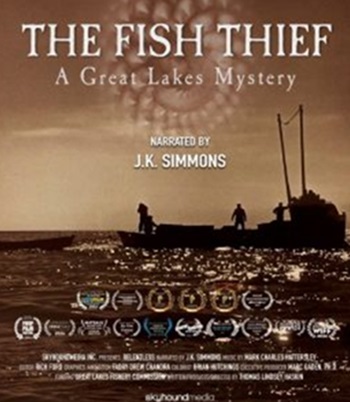 “THE FISH THIEF,” narrated by Oscar-winning actor J.K. Simmons, delves into the extraordinary effort to uncover the cause of a devastating environmental crisis. Was it overfishing, pollutants, or something else? Scientists on both sides of the border worked tirelessly to solve the mystery. In a dramatic eleventh-hour breakthrough, they discovered the true culprit: the invasive sea lamprey. This notorious predator arrived in the Great Lakes in the early twentieth century, triggering an ecological crisis and nearly wiping out populations of lake trout, whitefish, and other cornerstone species. The impact reverberated across the region, ruining local industries, damaging small town economies and indigenous communities, and destroying the livelihoods of people on both sides of the U.S. and Canadian border. A dedicated group of international scientists, policymakers, and conservationists banded together in a race against time to address this ecological invasion. more, >>CLICK TO READ<< 10:42
“THE FISH THIEF,” narrated by Oscar-winning actor J.K. Simmons, delves into the extraordinary effort to uncover the cause of a devastating environmental crisis. Was it overfishing, pollutants, or something else? Scientists on both sides of the border worked tirelessly to solve the mystery. In a dramatic eleventh-hour breakthrough, they discovered the true culprit: the invasive sea lamprey. This notorious predator arrived in the Great Lakes in the early twentieth century, triggering an ecological crisis and nearly wiping out populations of lake trout, whitefish, and other cornerstone species. The impact reverberated across the region, ruining local industries, damaging small town economies and indigenous communities, and destroying the livelihoods of people on both sides of the U.S. and Canadian border. A dedicated group of international scientists, policymakers, and conservationists banded together in a race against time to address this ecological invasion. more, >>CLICK TO READ<< 10:42








